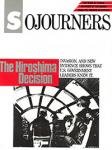The first thing I remember hearing about the atomic bomb was that it had saved the life of my father and of my family. In 1945 my father was a young naval officer aboard a destroyer-minesweeper in the Pacific Ocean. Just married and just graduated from college, he was shipped off to war and became part of the island-hopping U.S. forces that were moving steadily toward Japan.
He and his ship were scheduled for the invasion force that would be needed to take the Japanese islands. It was believed that 500,000 to a million U.S. lives could be lost in the invasion. Destroyer-minesweepers, because of their exceptionally dangerous job, had an unusually high mortality rate.
Then came August 6 and reports of a new kind of bomb dropped on the city of Hiroshima. The newscasts said it was many times more powerful than any bomb before. One explosion wiped out an entire city. Three days later the United States dropped another atomic bomb on the city of Nagasaki. The Japanese quickly surrendered.
Most people knew little about the bomb at that moment, much less about the implications of what had just happened. All everyone knew was that the war was over. The bomb had ended it, and the whole country was jubilant.
There would be no invasion now. My father would come home to his new bride and together they would raise five children. The bomb had saved my family.
Before he came home, though, my father's ship went to Hiroshima as part of the occupation force. He was, therefore, one of the first to see the devastation of the bomb. The destruction seemed unbelievable to him and made a lasting impression. One day while he was on patrol through what was left of Hiroshima, a little girl came out of the rubble and approached the U.S. soldiers. She was alone, wearing only rags, and she had no arms. When my father finally told me about the incident 39 years later, he cried. But, the bomb had ended the war.
In high school I read John Hersey's book Hiroshima and wondered if such horror could ever be right or justified for any reason. I was again reminded how our family had been spared.
Today more and more people have come to the conclusion that nuclear weapons are morally unacceptable—that on grounds of faith and conscience, there is not, nor could there ever be, any cause or purpose that justifies their use. The Hiroshima bombing was a sin—a sin that unleashed the greatest evil and the most urgent danger the world has ever known. Because of our Christian faith, my father and my whole family have come to share that deep conviction.
BUT NOW COMES a terrible revelation. The bomb was not necessary to end the war. It was not necessary to prevent an invasion. In fact, the bomb was not necessary at all. Over the years we have been learning the inside history of the Hiroshima decision, and what we have learned is a horrible shock. The things the people of the United States were told and have always believed about the necessity of the bomb are simply not true. It is now clear that Japan would have surrendered without the bomb and even without an invasion, and the leaders of the U.S. military and government knew it. The bomb was not the shot that ended the Second World War; instead, it was the opening round of the new Cold War. Its ultimate target was not the Japanese, but the Russians. The decision to use the atomic bomb was a calculated display of American power, military superiority, and political advantage. The Japanese nuclear victims were the first to pay the price of a new ideological conflict between two superpowers that would claim many more victims.
In this issue of Sojourners, Gar Alperovitz reveals new research and insights into the Hiroshima decision. His evidence is convincing, and his conclusions are chilling. The cost and consequences of the official hypocrisy and deception around the Hiroshima decision are staggering.
The bomb did not save the life of my family, nor could it ever save the life of any family. The bomb could, however, destroy all of our families—and will, unless we destroy it.
It is abundantly clear that the struggle to abolish nuclear weapons and rid the world of their awful threat will be long and arduous. Political belligerence, false patriotism, and moral blindness have taken up residence in the White House, and moral cowardice dwells in the halls of Congress. The public is still fearful of nuclear war, but is confused and easily misled. The nation still waits for the vision, without which, as the Bible says, we will surely perish. The only question now is faith and the quality of our courage.
If on this 40th anniversary of the Hiroshima and Nagasaki bombings the memory and present terror of the bomb can help awaken our faith and courage, then there will be hope for my family and for every family.
Jim Wallis is editor-in-chief of Sojourners magazine.

Got something to say about what you're reading? We value your feedback!
